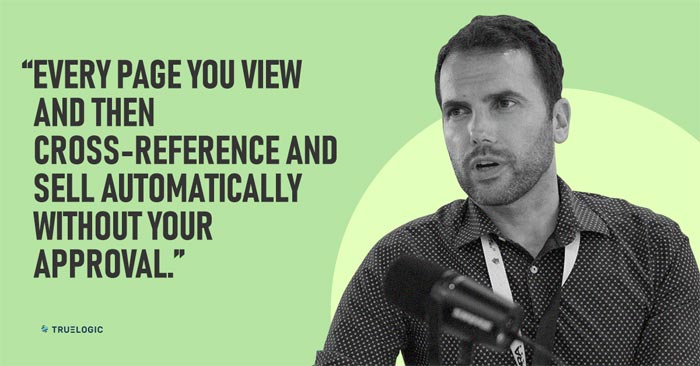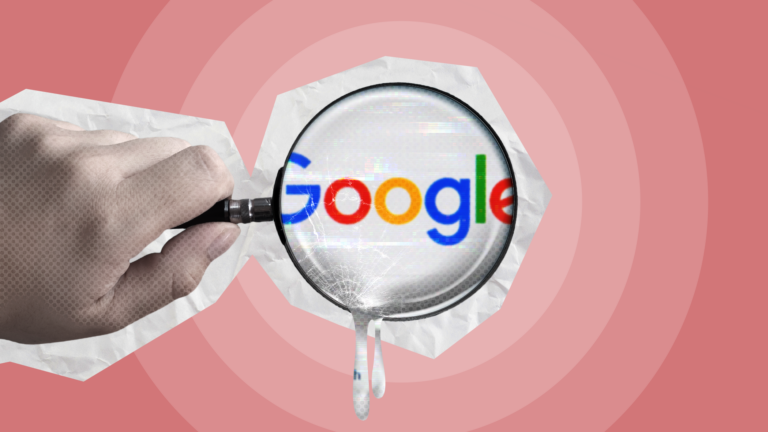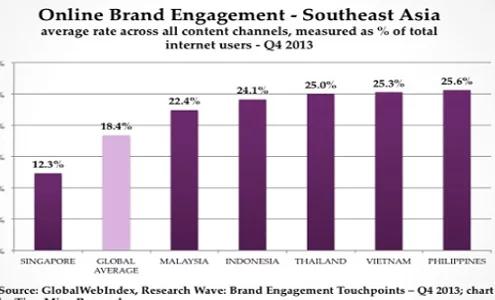Truelogic DX Podcast Episode 7 Recap: New Bill Alert: Banning Surveillance Advertising Act

The United States of America has unveiled a new privacy bill that would ban targeted advertising on digital platforms by social media giants like Facebook, Google, and others.
Introduced on January 18 this year by Representatives Anna Eshoo and Jan Schakowsky, and Senator Cory Booker, ‘The Banning Surveillance Advertising Act’, seeks to limit the ways that Big Tech serve ads to their users, banning the use of personal data altogether.
Will this bill be a huge game-changer for every digital marketer? How will this affect PH and local businesses targeting US markets?
Learn about the latest news in Digital Marketing in this episode of Truelogic DX – The Podcast Edition!
Podcast Transcription
Hi everyone, and welcome to another episode of the Truelogic DX Podcast. Today, we’re going to discuss something a bit controversial and its legislation that’s coming from the US that’s been proposed to Congress and it seeks a way that limits big tech. Big techs like Amazon, Google, Facebook, and the way they serve ads to users ban the use of a lot of personal data altogether.
So, will this be a game-changer for every digital marketer? Will it affect us here in the Philippines and or does it only target US markets or, you know, will it be adopted everywhere else? These are some of the questions that we’re going to try to answer in this episode.
And we are joined by Truelogic’s founder and our senior partner, Mr. Itamar Gero. So welcome to the Truelogic DX Podcast!
Banning Surveillance Advertising Act
Let’s see a broad overview of putting legislation that restricts the amount of information that advertisers could see. Is it generally leading to the good or the bad?
Well, as an advertiser, of course, the bad. I also don’t think it’s good because as a consumer, I would like to be advertised for things that are relevant to me, but the question is to what extent do those big tech companies go into exploiting my data or really zero in on my data?
And I think that’s the fine line. If we could find a way, I think they’re already finding a way to segmentize users versus naming them by name. But I think it’s- it’s bad generally.
I don’t even know how much of it is out there and how much is exploited. I think that as advertisers are kind of on the surface level of Google ads, and Facebook ads, we don’t see the data trading and data sets that are out there, so this is the part that is bad. The part that is good is the fact that it’s just, we’re going to see, we’re going to watch ads anyway. We might as well see something that’s relevant for us.
Legislation
I think let’s, let’s demystify what the content of the legislation is, right? Cause it’s a bit of a mouthful and I think when people hear it, they’re not really going to understand.
I think legislation is just written that way when it’s written in English. One of the things that it says is that they broke networks, and facilitators from using personal data, especially precise locations.
The other thing that they ban people from using as data would be gender, race, and religion, like that kind of personal data. Like, especially if you’re a data broker, but I think one of the weaknesses that I found in it, and there’s already an opinion piece there, is that for every instance that they find you violated, it was $5,000.
I mean, it was 500 to 5,000 men, that could multiply times hundreds of thousands. I think it’s mainly made to scare people when they start passing this legislation and this is not new. There are things in place, and therefore we can’t advertise for real estate. I think based on specifics, like gender, location, politics, and employment. So, it’s like, it’s already on their way, and I think they’re just trying to make it big, so somewhere they will meet in the middle because they must start with the best-case scenario for the legislator, the worst-case scenario for the advertising.
So, what does that mean? Like, to restrict the number of data advertisers can collect?
What pieces of information can advertisers collect?
At the end of the day, I didn’t think it’s a worry, but I think it’s more of a deep dive into who you are, what you are, what you bought cross-referencing later versus what you were in the market for something. I think being more practical about it, it will push advertisers to be more semantic about where they’re advertising.
It’s kind of like bringing us back to the olden days of advertising, where you buy banners on a website because you know that your users are on that website. And if, to be even more practical, it just brings you back to a rule of thumb, good marketing hygiene, or, you know what, just start collecting your users and your leads in, your own contact data versus relying on these Facebook ads that, you know, we can stop and then sales talk at any given day.
Will big techs like Facebook and Meta be affected?
There are a lot of assumptions in the market that the company, the big, bad that’s going to be affected by this the most is probably going to be Facebook and Meta. They’re probably the ones that are going to be the most affected by a restriction like this.
Do you think it’s generally targeted towards them, or do you think it’s just paranoia about big tech in general?
I think it generally started very permissive and very exploitable. I think if you look at it if you go backward, money starts to be very exploitable.
We started having banknotes in banks and then anybody with a bandana and a horse. Take that money. And then they started pulling back and saying, okay, we need to protect that money. And it’s the same with your private data. We saw the Cambridge Analytica case and how exploitable it is. They’re just trying to dial it back.
But the question is that back, how far? Cause I think it can go a bit far, maybe. When marketing costs are going to go up because you can’t target your real users, the cost to the profit will go up. Create inflation, jobs would be lost, and so on and so forth. So again, they’re trying to harness, I don’t think it’s anything, particularly against Facebook or Google or Amazon.
I also don’t think it’s very targeted toward Facebook. I think it’s because Facebook is always in the news so much already.
Although I do feel like this, and this is where my bias is going to step in a bit, I always feel like Google has been very ethical with my data. So, I know that they probably collect like, I mean, especially since I use Chrome, so they’re probably collecting more stuff about me than I bargained for, but I felt like in terms of the advertising experience that I get on Google, I have always felt that it’s been very appropriate. I don’t think any of it has been, has been inappropriate. I think Facebook always gets the flaggers. They’re always the guys getting called into Congress or someone is testifying against them.
Practically because Google really knows your, what they call the zero moments of truth. They know what you want to buy right now, and I haven’t advertised it, willing to buy it for you, sell it to you. But with Facebook, it’s kind of generally leisure time. Let’s show you some ads in the middle of a movie versus a vendor in front of you in a market that specializes in it.
I don’t think that Google is nicer than everybody else. And I think they have more information than everybody else. And I know that they’ll probably also share it to the ISP there as well. So I think they’re all, they’re all seniors in that regard.
Impact on small businesses
Marketing-wise, it’ll make a marketer’s life more difficult. I think for small businesses, it will make their life either more difficult or more expensive.
This is the initial, the top of the funnel phase. And if you develop those good marketing habits, I think it will be, you might make it more efficient to recycle drive users, find new leads, and keep them while they still lead. You don’t write zero buyers. But, you know, the usual content marketing, building authority, and providing value.
And I think there are people that are using the fact that getting leads on Facebook is so cheap that they just lean into it too much. Although I think there is a real impact that is going to happen on small business owners because let’s face it, advertising on Facebook is relatively cheap. Anybody can afford it. Like the first time, I tried it and I was used to Google, I’m like: what? It costs, how much?
I think that’s in the Philippines context. I think in the United States it’s already cutthroat and then people use it for e-commerce and then add Instagram into the mix. You really need to optimize your conversions. And I think the big bad that they’re trying to stop here is discrimination or voter suppression, so political topics.
Digital marketing and its politicization
I guess to a degree, the algorithm, and digital marketing is getting politicized, just like everything is getting politicized. But I think lawmakers are trying to prevent advertisers from exploiting users’ data.
Because the data does belong to the user, they’re trying to prevent another Cambridge Analytica or another 2016 election. But let’s talk about advertising channel by advertising channel. Right. What would a bill like this impact in terms of advertising on Google? Let’s say, will it yield similar, worse, or better results?
If you’re referring specifically to the bill that I’ve read earlier, I think it would be worse because they’re referring to search intent. And I don’t mind people knowing my search intent. I think it’s more about finding the middle way where I don’t mind you knowing that I just had the baby, we had the baby seven months ago, but don’t know me by name and the name of my baby and the birth of the baby. Just put me in a bucket that says male, new dad, and show me all the products for new dads with a seven-month-old.
And I think Google is starting to move in this direction without any legislative question?
No, there was. It was because it started there. I mean, even if they targeted Facebook or coincidentally, it mainly harmed Facebook, everybody understands that they need to brace themselves. And the question is what’s the middle way?
So, and I think one of the things you mentioned earlier is that the legislation has started taking it to one side of the extreme to see bigger tech will meet them halfway.
After this negotiation, you must solve it harshly to meet in the middle. If they started mildly, nothing would change. And I think again, it’s just a proposal because you’re going to take a lot of advancement and then step back to the dark ages of internet advertising.
Youtube advertising. Would it be the same, better, worse? Same banana? Worse? Yeah, you do use the same algorithms. If they can’t use your search intent, if they can’t know who you are, what’s your sex, you know, what’s your recent search history, you won’t know that.
And in my opinion, YouTube is already sort of like a wide net in terms of advertising. To me personally, it’s rarely very specific, unlike my Google experience. Like when you advertise just to meet something more specific.
Apple’s Privacy Update
I think the one move that was kind of enforced through Apple with the iOS is to opt-in to advertising. And I think if you want to make it a bit harsher, you just shut off all the ads and people like me that don’t mind seeing, you know, baby products, advertisements should opt-in, to begin with. Right now, everybody’s still opted in, in a way. And everybody’s data is out there in a way.
This sort of just takes Apple and codifies it into law, I think for them. What did that move for you? When Apple had a new feature or when the iPhone’s new feature was privacy, what was your opinion about that?
Actually, as a user, I think just that, that button that allows you to opt-out, it gives you power back. And it feels nice. And you know what, to be honest, I pressed all the time. Like, no, don’t give, don’t share my data – even though I do want to get customers, it’s just kind of like a new, new toy and it gives you power. So yeah, I guess as a user, it is good.
For me as a user, it sort of gave me a Marie Kondo moment with my iPhone.Yeah, because when it pops up and says, this app is trying to use this data and I’m thinking, well, but I don’t even need that app. I just got rid of it. Right. And then I will see, I’ll see another pop-up that says let’s see Fitbit.
Cause there’s the one I always say yes to. Fitbit has been accessing this data for the past couple of days. Do you want to let it continue accessing this data? It’s like once in a while, when you do your house cleaning for push notifications or after two approved access to yourself, maybe the middle ground is granting it by default and revoking it after seven days and 95 in the markets show me ads for the next seven days and then wipe my data. The thing is that you must trust that brokers wipe data. And I think this is where it won’t work.
I think even as marketers, we don’t even know the tip of the iceberg and what it looks like. I mean, we hear thousands of data points and more, but we don’t even have an idea. Cross-referencing your shopping or your credit card, where you’ve been, when you can cross-reference all these things you can really have a picture of a person.
What about Facebook? Like, what would it mean for both small businesses and marketers that were running ads on Facebook? If this law came into effect, based on how they recommend it, how would that affect a digital marketing company that manages a Facebook account, a business that’s got a captive theme that runs its Facebook campaign, what would they expect if something like this goes into law?
The basic hygiene for marketing
So again, I think it brings you back to basic hygiene for marketing, where you have to build your audience. You must get through either it’s a community or know where they hang out when it’s not just Facebook or specific groups within Facebook, getting their contact details, getting their data all the way to addresses at school, sending postcards, perhaps. It really brings you back to owning. And I think a lot of people are saying it’s when you rely on the platform to provide your sales, you know, the platform performs the sales, and you don’t own much so it’s really going back to proper marketing hygiene.
What is the possible impact of the legislation on e-commerce?
And we had a conversation like this with one of our clients that was sort of debating. Do I keep working with the channel partner? And then do I put my advertising dollars to that channel partner? Or do I build my own e-commerce capabilities, right? And they didn’t know the answer and we didn’t tell them what the answer was, but we sort of said, how much does your audience’s data matter to you? Like, does it matter to you? Does it have value? Because if it does, then build your own platform, like sure do e-commerce by yourself I mean don’t obliterate your channel partnerships.
Clearly, you’re driving inventory through there, but we told them if you, if your data matters, if you can create better experiences for your customers, for your, for your existing customers or your new potential customers, you get permission to buy your permission to sell to them from your website, then that’s the channel you want to go.
So, they eventually decided to go a mix. They will do their own e-commerce we’re working on now, but they will keep their channel partnership alive. And I think that’s an example of not being lazy. Don’t just rely on third parties.
That’s the thing. It’s best practice, but not always, you have the budget or the time there, but if you could do it, it might push you now to start focusing on discerning and understanding that you do need to do that. Maybe tell me what you think it would also leave the top of the funnel awareness campaigns mainly for the big brands that can afford to just kind of you know, spray it using Facebook and Google and the rest will go and find their groups becoming an authority, doing content marketing, um, if the law passed.
But I think isn’t this what Facebook is advocating? And I think they know this, right? Like they will only become a playground for the big boys for the people that can afford it. One of the things that we usually say about digital is it evens the playing field right? It doesn’t matter whether you’re small or you’re big, let the guy with a better campaign get the customers.
Disadvantages of the legislation
They think that if you can’t really focus and target specific people to ensure conversion from dollar to dollar, all that will be left to the awareness are big, broad campaigns and big budgets, naturally.
And the other thing that I remember, and I find this back to a previous conversation, the one that we had with Jason and that happened right when the iOS upgrade was happening, like when Apple announced that: Okay, our new feature is privacy.
So thank you for respecting my privacy, but not the excitement around that conversation, and I asked him if brands were worried about the upgrade that Apple was doing, like this privacy feature. And he said, no, for two reasons. A; the iPhone does not have the lion’s share of mobile, or mobile computing in the Philippines.
But the other is, aside from the fact that the mass market in the Philippines is majority Android, he also said the way brands off the circumvent, this is my having their own captive data. But when that approach also worked for a bit like this, like, so now it’s not Apple, that’s protecting your privacy. Now it’s a law protecting your privacy is the way to circumvent it, still, capture your users’ data, capture your audiences, all the way to capture leads’ data before they’re becoming customers. And it goes to content marketing and creating valuable information for people that are pre-decision to buy a product.
When I think about it, it’s even funnier, it might take us back so much to advertising on Google. Let’s say they build the task in the current form, which I don’t believe it ever will. And Google can’t really use your search and your search intent. It will become, again, a situation where you’re just placing a banner. If you place an ad on a website, then Google will have to become a content website, kind of like what Yahoo is doing.
If you buy banners on Facebook, it would be media buying on specific pages on specific content if Yahoo is not a search engine, right? They’re more like anymore though.
Because they were a portal. But now if you can’t really say, okay, this user is looking for this and that it has to be based on where they’re browsing, they’re browsing within an article about newborns. So then I can place it upright. So it’s kind of becoming a media buying situation.
So the audiences that are listening to this, though, of them might be thinking, okay, wait, what doesn’t the data protection law in the Philippines already prevent advertising and PR.
Like we all know the privacy law in the Philippines where they’re saying you have it’s why all these Filipino websites have this pop-up that says, I accept. But most Filipinos might think, okay, wait, but isn’t my data already protected? Why is this worth a Truelogic DX episode?
Data Privacy Law
I think this is what most people and most brands in the Philippines don’t understand about the data privacy law. The data, privacy law, just forces businesses to disclose what information of yours they capture.
Let’s prevent them from maliciously using it and reusing it. Well, I think whether this law would be passed, or not passed, it’s about wanting your data, asking politely for data you do, based on your geolocation, we become polite about the data you’re asking for, but also build yourself as a brand, as an authority, as a value providing a source for the lead, not for the client beforehand. I think a lot of brands are doing it. And I think most people don’t read privacy.
I think it’s made to be so tricky that you just click it, just to see the content under. I, you know, you don’t want to even ask you to, if you don’t want to approve it, they asked me to go and start kind of checking so many things you just say, you know what? I’ll just approve.
Let’s say, so sure, let’s operate under the assumption that US Congress will meet halfway, right? But some versions of this law will go into effect in the future. What would be the top two, top three things, small businesses, businesses in general, and marketers should do with your diaries? And this is something you shouldn’t do.
There is this rule of thumb. Build your database. You’ll be able to regain the loss from let’s say the inability to target from just being able to resell to your email list. And I know it sounds basic, but a lot of brands are not collecting email lists or they’re collecting it and they’re not using it appropriately.
Key Takeaway
I see what the laws would be about remarketing, but yeah, just go back to basics. Don’t look for shortcuts. Anyway, we said the three-spook advertising might be a shortcut, but I think it’s, it’s a short route to prospects, but I think building authority, building content, and capturing, capturing the data, for your own or likely asking for permission, going back to best practices before everybody’s information was just, you know, so exposed and floats out there.
And just talking about stuff like this with technical people, I think is sort of like looking at it from the way normal people will look at it. Most people I think will look at legislation. Legislation like this from a political perspective or a legal perspective,
From my perspective as a user, I don’t want my data to be there, but again, I’m telling you as a user, I do want to be marketed to things that are relevant without sharing my information. And mask it, John, call me tomorrow, just call me one, two, three, four, five, or put me in a segment in a bucket of dads for seven months.
So I think that’s the other takeaway here, right? Like I think brands and businesses should also understand there are people out there that do want to be advertised to, right? Like, don’t assume that everybody does not want to see advertising. If you are creating messages that have value or value at the right time. Your customers probably want to see it, and I think that’s a good wrap-up to this conversation.
Thank you for joining us for this episode. I’ll invite you to another one again and we’ll wait for the next digital controversy. Thank you very much for joining us on the Truelogic DX Podcast.









